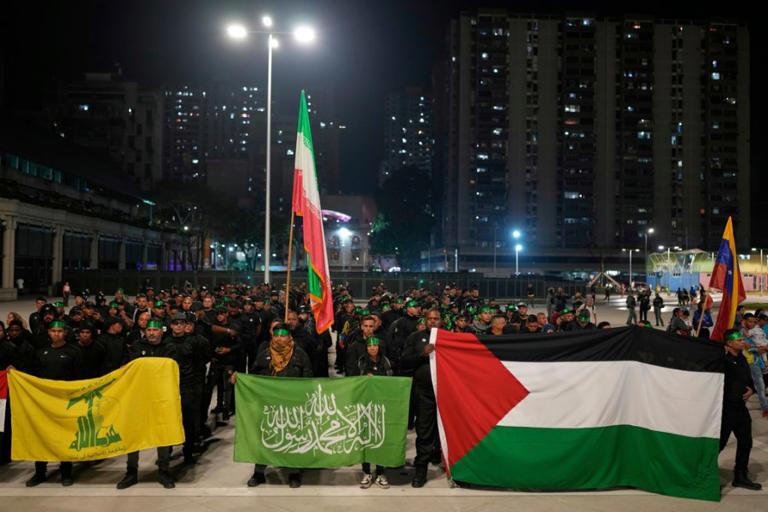
Congress aims to curb Hezbollah’s Latin American operations
In a recent phone call between Iranian President Masoud Pezeshkian and Colombian President Gustavo Petro, both men expressed eagerness in strengthening ties between their two countries. This should alarm the U.S., but a solution is working its way through the U.S. Senate.
The No Hezbollah in Our Hemisphere Act, which advanced in committee on April 4, is a critically important piece of legislation, spotlighting the under-addressed issue of the presence of Hezbollah and its patron, Iran, in Latin America. Iran bankrolls about 70 percent of Hezbollah’s budget, while the other 30 percent comes from its illicit activities
Introduced by Sens. Jacky Rosen (D-Nev.) and John Curtis (R-Utah), it imposes restrictions on officials supporting Hezbollah. It also requires intelligence agencies in partnership with the secretary of State to determine whether any country in the Western Hemisphere qualifies as a “terrorist sanctuary.”
However, the most important aspect of this bill is its imposition of travel restrictions and visa bans on government officials of countries that facilitate Hezbollah’s operations, which should incentivize these officials to take action against Hezbollah agents.
The No Hezbollah in Our Hemisphere Act also “engag[es] governments in Latin America to ensure they have adequate legislative tools to investigate terrorist activities and combat the financing of terrorism.” Latin American countries generally do not, so this aspect of the bill is essential in making its goals achievable.
Only Argentina, Colombia, Guatemala, Honduras and Paraguay have officially designated Hezbollah as a terrorist organization so far. The bill will encourage the rest of the countries to follow suit in order to avoid designation as a “terrorist sanctuary.”
Petro’s support for the Iranian regime is longstanding. He denounced the United States’ 2020 killing of Islamic Revolutionary Guard Corps Quds Force Commander Qasem Soleimani, who was also instrumental in the deaths of “hundreds of American and coalition service members and the wounding of thousands more,” according to the Department of Defense.
In the months leading up to his death, Soleimani coordinated a spate of attacks on coalition bases and the U.S. embassy in Baghdad, killing American and Iraqi personnel.
In August 2021, Iranian Rahmat Asadi allegedly coordinated a plot to pay two Colombians $100,000 to kidnap and murder two Israeli businessmen in Bogotá. Asadi enjoyed close ties to the IRGC and met the would-be assassins in a Dubai prison after he had been extradited from Thailand on murder charges.
Just three months later, Israel had to help one of its former intelligence officials flee Bogotá upon discovery that Hezbollah was surveilling him. This individual, as well as some U.S. diplomatic personnel, were assassination targets.
This bill comes a couple months after Secretary of State Marco Rubio discussed Iran’s growing influence in Venezuela at his confirmation hearing. Rubio touched on a critical point, as Hezbollah’s presence in Venezuela is even worse than in Colombia.
When Tareck El Aissami was Venezuela’s minister of the Interior from 2008 to 2012, he ordered Venezuelan passports to be issued to at least 800 people arriving monthly between May 2008 and October 2009 from Syria, Lebanon and Iraq, many of whom were Hezbollah members.
He abused his authority over residency permits to allow Hezbollah militants to remain in Venezuela with official documents. And so even though he is not currently in office, people he allowed into Venezuela may still reside in the country or be attempting to head north into the United States. It is entirely possible that many of the 262,633 people with Venezuelan passports who crossed our border in 2023 are not actually Venezuelan.
El Aissami also eased prison visitation rules, allowing for the flourishing of the underground economy. In 2017, the U.S. Department of the Treasury sanctioned El Aissami “for playing a significant role in international narcotics trafficking” as a Specially Designated Narcotics Trafficker, along with his frontman, after having frozen his assets in 2008 in response to his material support for Hezbollah. In 2019, El Aissami made the U.S. Immigration and Customs Enforcement Most Wanted list for similar activities.
Hezbollah’s presence extends throughout the continent, in addition to Colombia and Venezuela. It is perhaps the most severe yet most overlooked national security threat to the U.S. The No Hezbollah in Our Hemisphere Act is an essential step in mitigating the threat.





